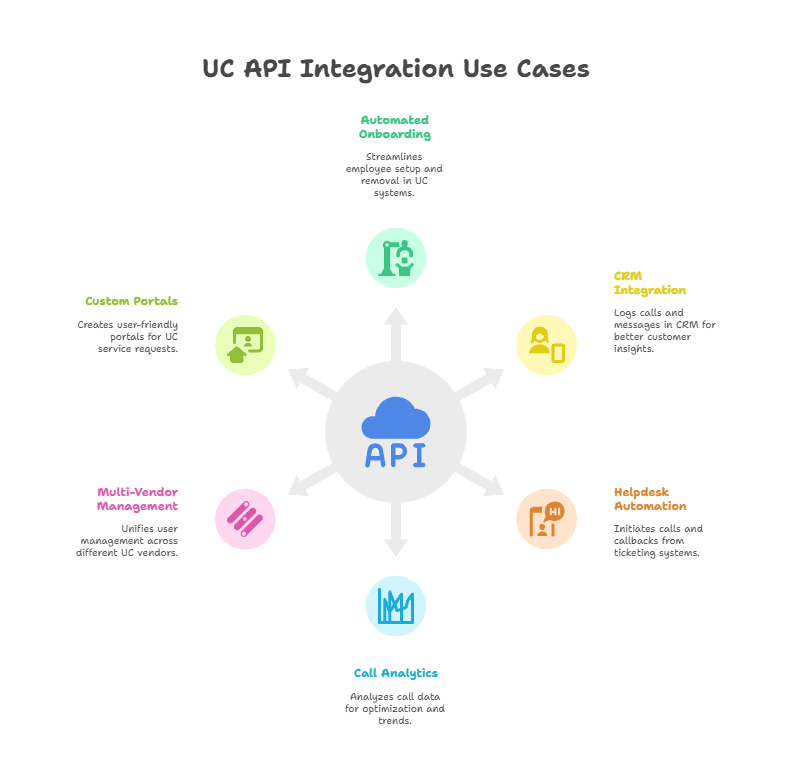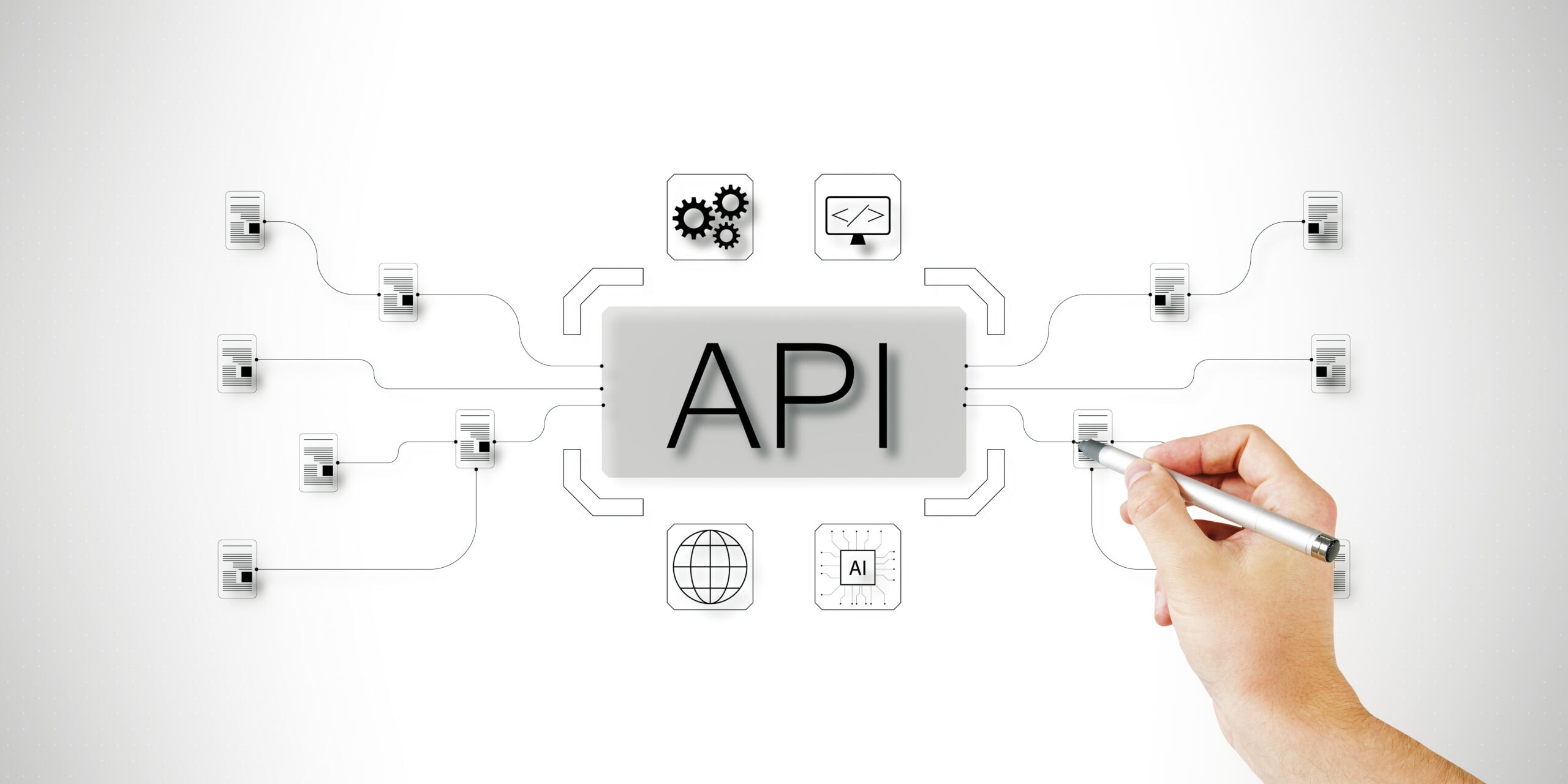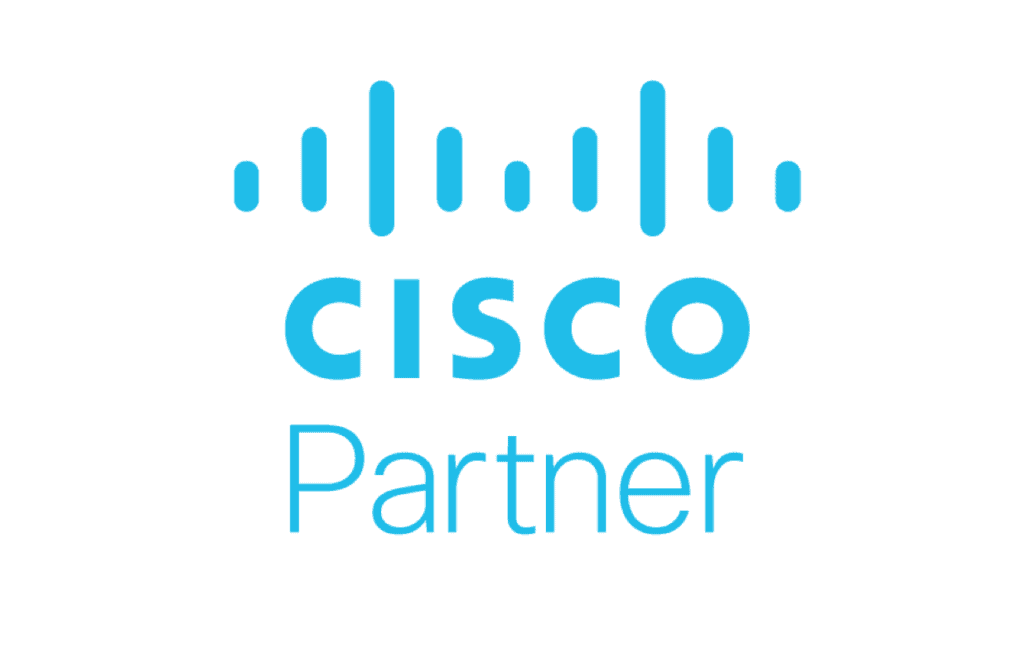What Are Unified Communications API Integrations?
Unified Communications (UC) API integrations are connections between communication platforms and business applications using programmable interfaces. APIs (Application Programming Interfaces) allow IT teams to automate tasks, sync data, and create seamless workflows across voice, messaging, conferencing, CRM, and other platforms.
These APIs expose UC functionalities, such as provisioning users, assigning phone numbers, logging calls, or managing devices, in a way that other systems can interact with. For businesses using platforms like Cisco Webex Calling, Microsoft Teams, or SIP-based UC systems, APIs allow for real-time coordination and automation.
With unified communications API integrations, organizations can:
- Automatically provision or de-provision users from a single HR or identity platform
- Sync communication data into CRMs or analytics dashboards
- Trigger UC actions from external events (e.g., create a meeting from a support ticket)
- Consolidate admin dashboards for better visibility and control
Common Use Cases for UC API Integrations
UC APIs can be used in a wide variety of ways, depending on the size of the organization, the UC tools in use, and the business objectives. Here are several examples:
- Automated Onboarding and Offboarding Instead of manually provisioning new employees in your UC system, you can connect your HR or identity management platform (e.g., Okta or Azure AD) to your UC solution. When an employee is hired or terminated, their communication services are automatically set up or removed.
- CRM Integration Sales and support teams often rely on tools like Salesforce or HubSpot. By integrating UC APIs, calls and messages can be automatically logged in the CRM, saving time and improving customer insights.
- Helpdesk Automation Integrate UC platforms with ticketing systems like ServiceNow or Zendesk. For example, a support agent can initiate a call from within a ticket interface, or a new support case can trigger an automatic callback to the customer.
- Call Analytics and Reporting Use APIs to stream call logs and meeting data into analytics platforms like Power BI, Looker, or Snowflake. This allows IT and operations teams to analyze usage, quality, and trends for optimization.
- Multi-Vendor Management Many enterprises operate hybrid environments with multiple UC vendors. API integrations help unify user management and reporting across these systems.
- Custom Portals for End Users APIs make it possible to create simple internal portals where employees can request UC services (e.g., request a phone line, report a device issue), which in turn triggers backend workflows without involving IT manually.

How Tuki Enables Seamless API-Driven UC Integrations
Tuki makes unified communications API integration straightforward by providing a platform that’s built with extensibility, automation, and enterprise-scale interoperability in mind.
Here’s how Tuki supports API-based UC automation:
- Unified API Layer Tuki’s platform exposes a consistent API layer that integrates with Cisco Unified Communications Manager (CUCM), Webex Calling, and other platforms. This means you don’t need to juggle vendor-specific APIs—Tuki handles the complexity for you.
- No Middleware Required Many businesses rely on multiple third-party solutions to bridge communication systems with business tools. Tuki eliminates that need. It acts as a centralized controller, allowing your IT team to configure, sync, and manage UC systems directly through API calls or GUI.
- Real-Time Sync with UC Systems Tuki doesn’t rely on static exports or batch updates. Its architecture connects live with your UC environment, ensuring any action performed via API is reflected in real time, reducing error, lag, and duplication.
- Flexible and Scalable Whether your organization operates across 10 or 10,000 endpoints, Tuki scales to meet your needs. Bulk provisioning, rule-based logic, and dynamic configurations allow for streamlined integration at any size.
- Custom Workflows Without Custom Code Tuki’s low-code orchestration allows IT teams to build tailored workflows without writing complex scripts. You can define actions based on triggers (e.g., new hire, new ticket, CRM update) and automate the necessary UC provisioning steps.
- Security and Auditability APIs can introduce risk if not governed properly. Tuki ensures all API actions are logged, traceable, and protected by role-based access control. You can integrate with your identity provider and monitor API usage centrally.
- Support for Multi-Tenant and Dedicated UC Architectures Tuki supports both Cisco Webex Calling Multi-Tenant and Dedicated Instance environments. This gives enterprises flexibility to maintain their UC architecture while layering on automation and integrations that work across both.
By enabling seamless API-driven integration, Tuki removes the operational friction that slows down UC service delivery and helps your organization respond faster to internal demands.
FAQs
What are the benefits of UC API integrations?
UC API integrations improve efficiency by automating provisioning, consolidating management, and connecting communication platforms with core business tools. They reduce manual IT overhead and create more agile workflows.
Which platforms can be integrated using UC APIs?
Common integrations include Cisco CUCM, Webex Calling, Microsoft Teams, CRMs (like Salesforce), HR systems (like Workday), ticketing systems (like Zendesk), and analytics tools (like Power BI). Tuki supports a wide range of these platforms.
Do UC API integrations require custom development?
Not necessarily. Platforms like Tuki offer low-code or no-code integration layers that reduce or eliminate the need for in-house development. However, more complex use cases may still require minimal customization.
Are UC API integrations secure?
Yes, when done properly. API platforms should support encryption, authentication, and role-based access. Tuki offers robust governance tools to ensure secure and auditable API activity.
Can API integrations support multi-location or hybrid UC environments?
Absolutely. Tuki is designed to manage UC across multi-tenant, hybrid, and distributed architectures, making it easy to automate workflows at scale.










